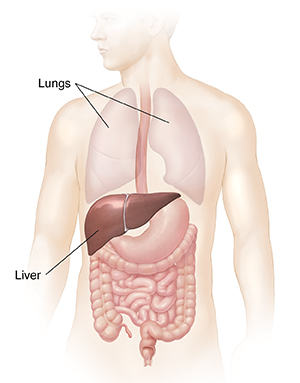Liver Cancer: Introduction
What is cancer?
Cancer starts when cells in the body change (mutate) and grow out of control. Your body is made up of tiny building blocks called cells. Normal cells grow when your body needs them and die when your body doesn't need them any longer.
Cancer is made up of abnormal cells that grow even though your body doesn't need them. In most cancers, the abnormal cells grow to form a lump or mass called a tumor. If cancer cells are in the body long enough, they can grow into (invade) nearby areas. They can even spread to other parts of the body (metastasize).
What is liver cancer?
Liver cancer is cancer that starts in your liver. It's also called primary liver cancer. Primary liver cancer is not the same as cancer that started somewhere else in the body and then spread (metastasized) to the liver. Cancer that starts in another organ, such as the colon, breast, or lung, and then spreads to the liver is called secondary liver cancer. Secondary liver cancer is far more common in the U.S. than primary liver cancer. Cancer that has spread to the liver from somewhere else is treated like the original cancer. For instance, lung cancer that has spread to the liver is treated like lung cancer.
Understanding the liver
The liver is a large, pyramid-shaped organ that lies behind your ribs on the right side of your body. It’s under the right lung. It's divided into right and left lobes.
The liver helps break down and store nutrients. These include sugars, starch, fats, and proteins. It also makes proteins, such as albumin. This helps the body balance fluids. The liver makes clotting factors, which help blood get thick or clot when a person is bleeding. Bile made in the liver is important for digesting food and for other bodily functions.
One of the liver’s most important jobs is to filter out and destroy toxins in the blood. When the liver isn’t working well, chemicals can build up inside the body and cause damage.

What types of cancer start in the liver?
The main types of primary liver cancer include:
-
Hepatocellular carcinoma. This is the most common liver cancer. About 4 out of every 5 primary liver cancers are this type. It starts in the main liver cells called hepatocytes.
-
Intrahepatic cholangiocarcinoma (bile duct cancer). About 1 in 10 to 1 in 5 liver cancers are cholangiocarcinomas. These cancers start in the bile ducts. These are small tubes that carry bile out of the liver and into the gallbladder and intestines during digestion. Cholangiocarcinoma cancers can also start in the bile ducts outside the liver.
-
Hepatoblastoma. This is a very rare liver cancer. It's most often found in young children.
-
Angiosarcoma. This is another rare form of liver cancer. It starts in blood vessels inside the liver.
Several types of noncancer (benign) tumors can also form in the liver. These include hemangiomas, hepatic adenomas, and focal nodular hyperplasia. These tumors don’t spread to other parts of the body. But they can still cause problems if they grow large enough or bleed.
Talk with your healthcare provider
If you have questions about liver cancer, talk with your healthcare provider. Your healthcare provider can help you understand more about this cancer.
Online Medical Reviewer:
Jessica Gotwals RN BSN MPH
Online Medical Reviewer:
Susan K. Dempsey-Walls RN
Date Last Reviewed:
9/1/2025
© 2025 The StayWell Company, LLC. All rights reserved. This information is not intended as a substitute for professional medical care. Always follow your healthcare provider's instructions.